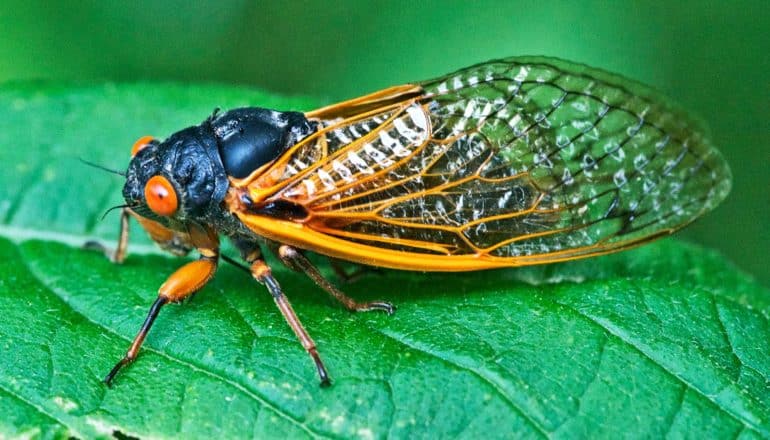
Brood X cicadas are coming of age in world that is drastically altered from the one their ancestors knew.
Not only is this no longer their grandfather’s or great-grandfather’s planet, it’s one that some bugs might barely recognize—with a changed climate and living conditions that are forcing adaptive changes for some species, like moths that no longer fly to bright lights or crickets remixing their love song.
“Brood X cicadas, like all periodical cicadas, are a Rip Van Winkle story,” says Brett Seymoure, a postdoctoral fellow with the Living Earth Collaborative at Washington University in St. Louis. “They live underground for 17 years, and then come up to a completely different world due to human-induced rapid environmental change, or HIREC.”
Cicada culture shock
Periodical cicadas comprise seven of the roughly 3,000 species of cicadas—and they tend to get all the press. They only occur in the eastern United States. Unlike most cicadas, periodical cicadas lay eggs that hatch and then their nymphs burrow underground for either 13 or 17 years, depending on the species.
Brood X is made up of a few species in the genus Magicicada and is one of the biggest groups—containing hundreds of billions of individuals.
“The mating conditions that Brood X’s parents had were quite different,” says Seymoure, a behavioral ecologist who studies the effects of lighting on animal behavior, physiology, and ecology. “And if you think back to when their great-grandparents mated, it was 1970! This is very interesting to think about in light of man-made environmental change.
“Most insect species have several generations in one year and thus natural selection can select for individuals that are better able to cope with rapid changes,” he says. “In fact, we have seen that some populations of moths are no longer attracted to artificial lights at night.”
Other insects have adapted to human-caused environmental change, but most of them have several generations in one year. Grasshoppers and crickets, for example, rely on courtship songs to find mates—just like cicadas—and they’ve found ways to deal with noise from traffic or other industrial activity. They’ve literally changed the frequency of their courtship songs to be more conspicuous against the daily drum of human disturbance.
Can Brood X cicadas adapt?
But Brood X cicadas only sample the modern world for only a handful of days every 17 years. How can they keep up?
Adults are above ground so briefly—and at intervals that are such wide stretches apart—that scientists struggle with observing adult behaviors and designing experiments around them. As a result, there is little known about how rapid changes in the environment affect periodical cicadas.
“We do know that nymphs use ground temperature to determine when to emerge and begin the adult phase (i.e., find mates). And we know that due to climate change, it seems that some populations are emerging earlier and not waiting the 17 years,” Seymoure says.
And it’s not only warming temperatures.
Light pollution is another powerful human-induced stressor on insects. Many bugs respond to light—whether it’s natural light from the full moon, different types of light bulbs, or diffuse sky glow caused by light pollution in urban areas. Light pollution from artificial light at night is thought to be one factor contributing to global declines in arthropod abundance over the last few decades.
“Other species of cicadas are attracted to lights at night,” Seymoure says. “They’re the ones that are active at dawn and dusk. On the other hand, periodical cicadas are active during the day and usually begin copulating in late afternoon and then become inactive. So we don’t know if these cicadas are generally attracted to lights or not, and if there are any other effects on their biology from light pollution.
“If there are,” Seymoure says, “it will be very interesting to see how these bugs handle the light conditions that are tens of times worse than they were in 2004.”
Source: Washington University in St. Louis
The post Brood X cicadas will emerge to a very different world appeared first on Futurity.
from Futurity https://ift.tt/3tRGasx
No comments:
Post a Comment